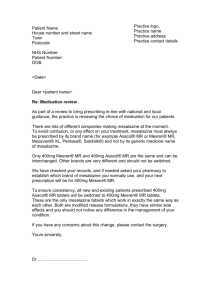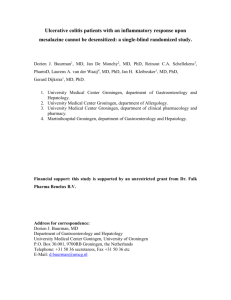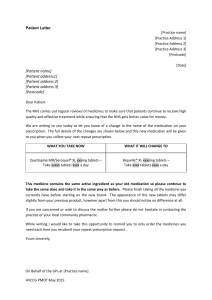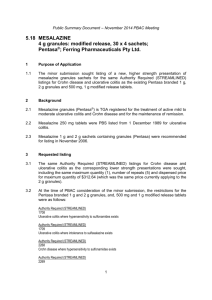UKMi Oral Mesalazine Bioequivalence
advertisement
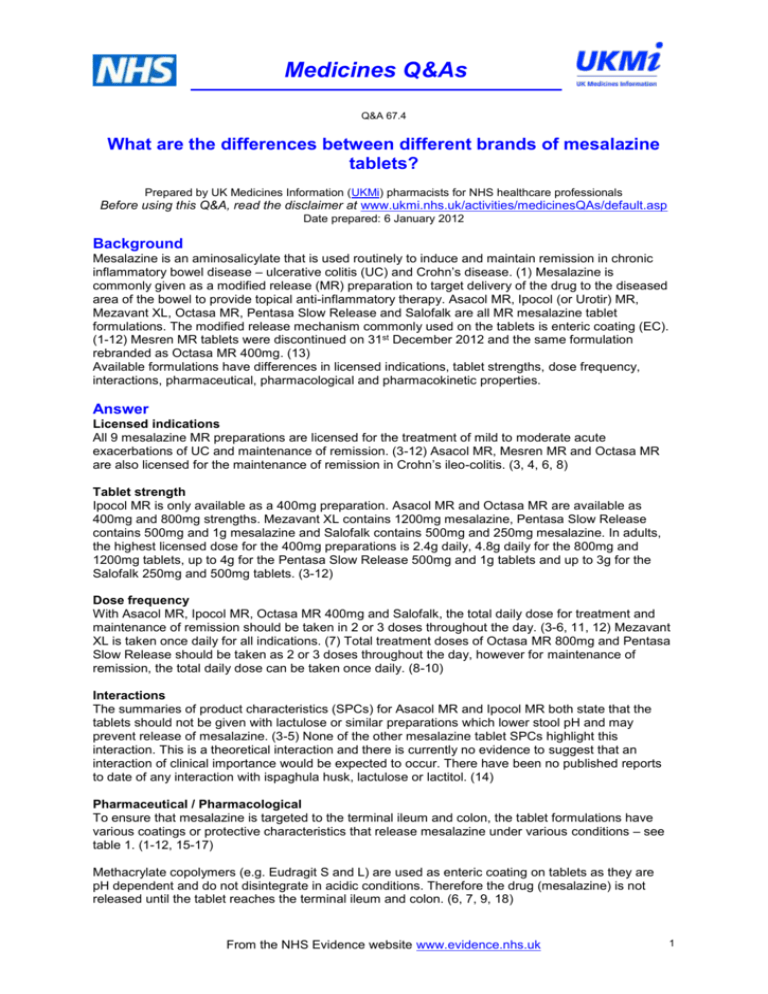
Medicines Q&As Q&A 67.4 What are the differences between different brands of mesalazine tablets? Prepared by UK Medicines Information (UKMi) pharmacists for NHS healthcare professionals Before using this Q&A, read the disclaimer at www.ukmi.nhs.uk/activities/medicinesQAs/default.asp Date prepared: 6 January 2012 Background Mesalazine is an aminosalicylate that is used routinely to induce and maintain remission in chronic inflammatory bowel disease – ulcerative colitis (UC) and Crohn’s disease. (1) Mesalazine is commonly given as a modified release (MR) preparation to target delivery of the drug to the diseased area of the bowel to provide topical anti-inflammatory therapy. Asacol MR, Ipocol (or Urotir) MR, Mezavant XL, Octasa MR, Pentasa Slow Release and Salofalk are all MR mesalazine tablet formulations. The modified release mechanism commonly used on the tablets is enteric coating (EC). (1-12) Mesren MR tablets were discontinued on 31st December 2012 and the same formulation rebranded as Octasa MR 400mg. (13) Available formulations have differences in licensed indications, tablet strengths, dose frequency, interactions, pharmaceutical, pharmacological and pharmacokinetic properties. Answer Licensed indications All 9 mesalazine MR preparations are licensed for the treatment of mild to moderate acute exacerbations of UC and maintenance of remission. (3-12) Asacol MR, Mesren MR and Octasa MR are also licensed for the maintenance of remission in Crohn’s ileo-colitis. (3, 4, 6, 8) Tablet strength Ipocol MR is only available as a 400mg preparation. Asacol MR and Octasa MR are available as 400mg and 800mg strengths. Mezavant XL contains 1200mg mesalazine, Pentasa Slow Release contains 500mg and 1g mesalazine and Salofalk contains 500mg and 250mg mesalazine. In adults, the highest licensed dose for the 400mg preparations is 2.4g daily, 4.8g daily for the 800mg and 1200mg tablets, up to 4g for the Pentasa Slow Release 500mg and 1g tablets and up to 3g for the Salofalk 250mg and 500mg tablets. (3-12) Dose frequency With Asacol MR, Ipocol MR, Octasa MR 400mg and Salofalk, the total daily dose for treatment and maintenance of remission should be taken in 2 or 3 doses throughout the day. (3-6, 11, 12) Mezavant XL is taken once daily for all indications. (7) Total treatment doses of Octasa MR 800mg and Pentasa Slow Release should be taken as 2 or 3 doses throughout the day, however for maintenance of remission, the total daily dose can be taken once daily. (8-10) Interactions The summaries of product characteristics (SPCs) for Asacol MR and Ipocol MR both state that the tablets should not be given with lactulose or similar preparations which lower stool pH and may prevent release of mesalazine. (3-5) None of the other mesalazine tablet SPCs highlight this interaction. This is a theoretical interaction and there is currently no evidence to suggest that an interaction of clinical importance would be expected to occur. There have been no published reports to date of any interaction with ispaghula husk, lactulose or lactitol. (14) Pharmaceutical / Pharmacological To ensure that mesalazine is targeted to the terminal ileum and colon, the tablet formulations have various coatings or protective characteristics that release mesalazine under various conditions – see table 1. (1-12, 15-17) Methacrylate copolymers (e.g. Eudragit S and L) are used as enteric coating on tablets as they are pH dependent and do not disintegrate in acidic conditions. Therefore the drug (mesalazine) is not released until the tablet reaches the terminal ileum and colon. (6, 7, 9, 18) From the NHS Evidence website www.evidence.nhs.uk 1 Medicines Q&As A comparison of the efficacy and safety of Eudragit-L and ethylcellulose coated mesalazine tablets in patients with mild to moderately active UC concluded that both preparations were well tolerated and equally effective in achieving remission over 8 weeks. (19) Table 1 – Formulation & release characteristics of MR mesalazine tablets Drug Formulation Asacol MR 400mg: Enteric coated with Eudragit S 800mg: Enteric coated with Eudragit S and Eudragit L Enteric coated with Eudragit S Film coated with methacrylate copolymers Type A, Type B Enteric coated with Eudragit S Ethylcellulose coated microgranules to allow slow continuous release Enteric coated with Eudragit L Ipocol (Urotir) MR Mezavant XL Octasa MR Pentasa Slow Release Salofalk Optimal drug release pH Site of drug release >7 Terminal ileum & large bowel (colon & rectum) >7 >7 Terminal ileum & colon Colon >7 Enteral pH Terminal ileum & colon Duodenum to rectum >6 Terminal ileum & colon The British National Formulary states that ‘the delivery characteristics of EC mesalazine preparations may vary; these preparations should not be considered interchangeable’. (1) A clinical trial comparing Ipocol MR with Asacol 400mg MR concluded that clinicians prescribing mesalazine should select a particular formulation and assuming it is effective and well tolerated, patients should continue to use the specific formulation without unplanned substitution of other agents. (15) Pharmacokinetic A systematic review of the pharmacokinetic profiles of oral mesalazine formulations and mesalazine pro-drugs used in the management of UC concluded that the systemic exposure to 5-aminosalicylate (5-ASA) as measured by urinary excretion of total 5-ASA and faecal excretion of 5-ASA is comparable for all oral mesalazine formulations and pro-drugs. This review was conducted in 2003 and the preparations included were Asacol 400mg MR, Pentasa Slow Release and Salofalk. (20) Ipocol MR and Octasa MR 400mg are generic versions of Asacol 400mg MR. The in vitro dissolution profile of Octasa MR is virtually identical to that of Asacol 400mg MR while the Ipocol MR dissolution profile is different – see table 2. (17) Table 2 - Release characteristics of Asacol 400mg MR, Ipocol MR & Octasa MR tablets pH 1.0-1.2 for 2 hours pH 6.4 for 1 hour pH 7.2 for 1 hour Asacol 400mg MR 0% release <1% released ~98% released in 30 - 60 minutes Ipocol MR 0% drug release 13% – 41% released 59% released in 30 - 60 minutes Octasa MR 0% release <1% released ~99% released in 30 60 minutes pH 1.0-1.2 mimics the conditions in the stomach, pH 6.4 – 6.5 mimics the conditions in the small bowel and pH 7.2 - 7.5 mimics the conditions in the terminal ileum/colon. (16) An 8 week multicentre, randomized controlled trial comparing Ipocol MR with Asacol 400mg MR in 88 patients with ulcerative colitis found both preparations to be effective in treating a mild to moderate relapse. (15) Patients’ colitis score improved with both formulations (Ipocol MR by 2.3 and Asacol 400mg MR by 1.5, difference not significant) and a similar proportion of patients were in clinical remission by the end of the study (26.1% for Ipocol MR and 28.6% for Asacol 400mg MR, difference not significant). Oral prednisolone was required in a larger number of patients taking Asacol 400mg MR (11.9% vs. 6.5%, difference not significant) whereas fewer Asacol 400mg MR patients required topical steroids (11.0% vs. 17.4%, difference not significant). There were no unexpected adverse events and the number of adverse effects was similar between the 2 groups (Asacol 400mg MR 73.8% vs. Ipocol MR 73.9%). From the NHS Evidence website www.evidence.nhs.uk 2 Medicines Q&As Octasa MR 400mg was previously branded as Mesren MR. Octasa MR has not been compared to other mesalazine MR preparations in patient studies because to obtain a licence as a generic medicine, the product only needs to demonstrate bioequivalence to the brand leader. (17, 21) A review of oral aminosalicylate formulations for ulcerative colitis in the Drug & Therapeutics Bulletin in January 2011 concluded that there is very little difference in terms of efficacy between mesalazine preparations so choice should depend on factors that may aid adherence to therapy; for example, less frequent dosing has been shown for some preparations to be as effective as multiple daily dosing. (22) The British Society of Gastroenterology 2011 guidelines for management of inflammatory bowel disease do not differentiate between different brands of mesalazine. The guidelines state that efficacy with aminosalicylates may depend more on adherence with the prescribed dose than the delivery system. (23) Summary Asacol MR, Ipocol MR, Mezavant XL, Octasa MR, Pentasa Slow Release and Salofalk are all licensed for treatment of mild to moderate ulcerative colitis and maintenance of remission in ulcerative colitis. Asacol MR and Octasa MR are also licensed for maintenance of remission in Crohn’s ileo-colitis. Asacol MR, Ipocol MR and Octasa MR are all 400mg preparations. Asacol MR and Octasa MR are also available as an 800mg tablet. Mezavant XL contains 1200mg, Pentasa Slow Release contains 500mg and 1g and Salofalk contains 500mg and 250mg mesalazine. Total daily doses of Asacol MR 400mg, Ipocol MR, Octasa MR 400mg and Salofalk should be taken in 2 or 3 doses throughout the day. Mezavant XL is taken once daily for all indications. Total treatment doses of Octasa MR 800mg and Pentasa Slow Release should be taken as 2 or 3 doses throughout the day, however for maintenance of remission, the total daily dose can be taken once daily. Asacol MR, Ipocol MR and Octasa MR are all similar in terms of formulation, optimal pH for drug release and site of drug release. Mezavant XL, Pentasa Slow Release and Salofalk have slightly different formulations and optimal pH for drug release. Pentasa has a slightly different site of drug release too. The British National Formulary states that ‘the delivery characteristics of EC mesalazine preparations may vary; these preparations should not be considered interchangeable’. A systematic review examining pharmacokinetic profiles concluded that systemic exposure to 5aminosalicylate is comparable for Asacol 400mg MR, Pentasa Slow Release and Salofalk. There is some in vitro evidence of inequivalence between Ipocol MR and Asacol 400mg MR particularly with regard to the timing of dissolution at neutral pH. Octasa MR 400mg has a virtually identical in vitro dissolution profile to Asacol 400mg MR. In a small clinical trial, Ipocol MR has been shown to be as safe and effective as Asacol 400mg MR. Octasa MR 400mg has not been compared to Asacol 400mg MR in a clinical trial. A recent review of aminosalicylates concluded that for mesalazine MR formulations there is very little difference in terms of efficacy between mesalazine preparations so choice should depend on factors that may aid adherence to therapy; for example, less frequent dosing has been shown for some preparations to be as effective as multiple daily dosing. Limitations There are other mesalazine products available (e.g. enemas, suppositories, granules and foam) which this Q&A has not addressed. References 1. Joint Formulary Committee. British National Formulary. 64th ed. London: British Medical Association and The Royal Pharmaceutical Society of Great Britain; September 2012 2. Forbes A, Cartwright A, Marchant S et al. Review article: oral, modified release mesalazine formulations – proprietary versus generic. Aliment Pharmacol Ther 2003; 17: 1207-14. 3. Summary of Product Characteristics – Asacol 400mg MR tablets. Warner Chilcott UK Limited. Last revised 1 May 2010. Accessed via http://emc.medicines.org.uk on 04/01/12. From the NHS Evidence website www.evidence.nhs.uk 3 Medicines Q&As 4. Summary of Product Characteristics – Asacol 800mg MR tablets. Warner Chilcott UK Limited. Last revised 29 November 2010. Accessed via http://emc.medicines.org.uk on 04/01/12. 5. Summary of Product Characteristics – Ipocol 400mg MR tablets. Sandoz Limited. Last revised March 2011. Accessed via http://emc.medicines.org.uk on 04/01/12. 6. Summary of Product Characteristics – Octasa MR 400mg tablets. Tillotts Pharma Limited. Last revised 15 October 2012. Accessed via http://emc.medicines.org.uk on 04/06/13. 7. Summary of Product Characteristics – Mezavant XL 1200mg, gastroresistant, prolonged release tablets. Shire Pharmaceuticals Limited. Last revised 24 August 2010. Accessed via http://emc.medicines.org.uk on 04/01/12. 8. Summary of Product Characteristics – Octasa 800mg MR tablets. Tillotts Pharma Limited. Last revised 23 June 2011. Accessed via http://emc.medicines.org.uk on 04/01/12. 9. Summary of Product Characteristics – Pentasa Slow Release Tablets 500mg. Ferring Pharmaceuticals Ltd. Last revised 29 September 2009. Accessed via http://emc.medicines.org.uk on 04/01/12. 10. Summary of Product Characteristics – Pentasa Slow Release Tablets 1g. Ferring Pharmaceuticals Ltd. Last revised 1 July 2011. Accessed via http://emc.medicines.org.uk on 04/01/12. 11. Summary of Product Characteristics – Salofalk 250mg Tablets. Dr Falk Pharma UK Ltd. Last revised September 2010. Accessed via http://emc.medicines.org.uk on 04/01/12. 12. Summary of Product Characteristics – Salofalk 500mg gastroresistant tablets. Dr Falk Pharma UK Ltd. Last revised August 2010. Accessed via http://emc.medicines.org.uk on 04/01/12. 13. Personal communication. Tillotts Pharma, 19 April 2013. 14. Baxter K (ed). Mesalazine (Mesalamine) + Laxatives, last updated 10 Nov 2010. Stockley’s Drug Interactions. London: Pharmaceutical Press. Accessed via http://www.medicinescomplete.com/ on 04/01/12. 15. Forbes A, Al-Damluji A, Ashworth S et al. Multicentre randomised controlled clinical trial of Ipocol, a new enteric-coated form of mesalazine, in comparison with Asacol in the treatment of ulcerative colitis. Aliment Pharmacol Ther 2005; 21: 1099-1104. 16. Fadda HM & Basit AW. Dissolution of pH responsive formulations in media resembling intestinal fluids: bicarbonate versus phosphate buffers. J Drug Del Sci Tech 2005; 15 (4): 273-9. 17. Grosso A, Bodalia P & Shah M. A review of mesalazine MR formulations in ulcerative colitis. Brit J Clin Pharm 2009; 1: 333-6. http://www.clinicalpharmacy.org.uk/December/review.pdf 18. Chang RK, Peng Y, Trivedi N et al. Polymethylacrylates. Date last revised 4 March 2009. In: Rowe RC (editor). Pharmaceutical Excipients. Pharmaceutical Press & American Pharmacists Association (electronic version). Accessed via http://www.medicinescomplete.com on 04/01/10. 19. Gibson PR, Fixa B, Pekarkova B et al. Comparison of the efficacy and safety of Eudragit-Lcoated mesalazine tablets with ethylcellulose-coated mesalazine tablets in patients with mild to moderately active ulcerative colitis. Aliment Pharmacol Ther 2006; 23: 1017-1026. 20. Sandborn WJ & Hanauer SB. Systematic review: the pharmacokinetic profiles of oral mesalazine formulations and mesalazine pro-drugs used in the management of ulcerative colitis. Aliment Pharmacol Ther 2003; 17: 29-42. 21. Notes for guidance on the investigation of bioavailability and bioequivalence. Committee for Proprietary Medicinal Products. 2001. www.emea.europa.eu/pdfs/human/ewp/140198en.pdf 22. Which oral aminosalicylate for ulcerative colitis? Drug & Therapeutics Bulletin 2011; 49: 8-12 23. Carter MJ, Lo Mowat et al. Guidelines for the management of inflammatory bowel disease in adults. Gut 2011; 60 (5): 571-607. http://www.bsg.org.uk/images/stories/docs/clinical/guidelines/ibd/ibd_2011.pdf Quality Assurance Prepared by Katie Smith, East Anglia Medicines Information Service, Ipswich Hospital NHS Trust Contact Katie.smith@ipswichhospital.nhs.uk Date Prepared 6th January 2012 (date of partial revision 26th October 2012, 4th June 2013) From the NHS Evidence website www.evidence.nhs.uk 4 Medicines Q&As Checked by Sarah Cavanagh, East Anglia Medicines Information Service, Ipswich Hospital NHS Trust Date of check 20th January 2012 (partial revision checked 26th October 2012, 5th June 2013) Search strategy In-house enquiry database, search term: mesalazine British National Formulary, No. 64, London: British Medical Association and The Royal Pharmaceutical Society of Great Britain, September 2011, search term: mesalazine Martindale, The Complete Drug Reference. Pharmaceutical Press. Accessed via www.medicinescomplete.com, search term: mesalazine Stockleys Drug Interactions. Pharmaceutical Press. Accessed via www.medicinescomplete.com, search term: mesalazine Electronic Medicines Compendium, accessed via www.emc.medicines.org.uk, search term: mesalazine Teva UK Ltd website, accessed via http://www.tevauk.com/generics/home, search term: mesalazine National electronic Library for Medicines, accessed via www.nelm.nhs.uk, search term: mesalazine Bandolier, accessed via http://www.medicine.ox.ac.uk/bandolier/, search term: mesalazine The Cochrane Library, accessed via http://www.library.nhs.uk/, search term: mesalazine IDISweb, search terms: Results of: Drug(s): "MESALAMINE 56400007" and Disease(s): "ENTERITIS, REGIONAL 555." or "PROCTOCOLITIS, IDIOPATHIC 556." and Descriptor(s): "ADM ORAL 64" Years: 2010-2012 Medline, 1950 to date, search terms: MESALAMINE/ AND DELAYED-ACTION PREPARATIONS/ [Limit to: Publication Year 2010-Current and Humans and English Language] Embase, 1980 to date, search terms: MESALAMINE/ AND SUSTAINED-RELEASE PREPARATIONS/ [Limit to: Publication Year 2010-Current and Humans and English Language] From the NHS Evidence website www.evidence.nhs.uk 5
